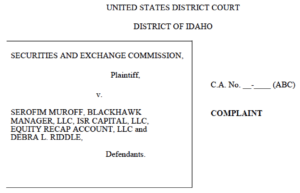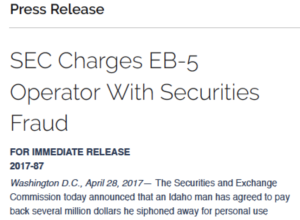Types Of SEC Cases: Stealing Client Funds
SEC Settles EB-5 Fraud Case Accusing Defendant Of Stealing Client Funds
The U.S. Securities and Exchange Commission (“SEC”) settled charges against two U.S. citizens from Idaho, for stealing client funds intended for EB-5 Immigrant Investor Program projects. The EB-5 Immigrant Investor Program (“EB-5” or the “EB-5 Program”) is administered by the U.S. Citizenship and Immigration Services (“USCIS”). The Program was established to encourage foreign investment in U.S. businesses that would create jobs for U.S. citizens in the United States. Under the EB-5 Program, foreign nationals who make investments in specific projects in the U.S., that create or preserve jobs for at least 10 U.S. workers, are allowed to apply for U.S. residency.The EB-5 Scheme
In its court Complaint, the SEC accused Serofim Muroff of misappropriating millions of dollars of client funds for his own personal use.
The SEC’s court Complaint
Stealing Client Funds
While some of the capital raised was used for the stated investments, Muroff allegedly siphoned off approximately $5 million of the investors’ money for his own use. Among the fraudulent uses described in the Complaint, Muroff used $1.1 million of the investors’ money to purchase two personal homes, $87,000 to buy two automobiles, $97,000 for personal expenses, and $423,000 to invest in a zip-line business. The Complaint also accuses Muroff of stealing client funds so that he could invest in options trading. He allegedly stole $20 million of investors’ money for this purpose. Muroff’s options trading resulted in a loss of more than $1 million.
The SEC’s press release
CFO Also Charged
The SEC also charged Debra Louise Riddle with participating in the scheme and facilitating Muroff’s stealing client funds. Riddle was listed as ISR Capital’s Chief Financial Officer. However, she essentially served as Muroff’s bookkeeper and personal assistant. Riddle was accused of channeling investor’s capital out of the investment companies and into Muroff’s personal company, Equity Recap Account, LLC. From there she further channeled the money to Muroff for his personal use. The SEC also claimed that Riddle funneled the illegal commissions to the Taiwanese company that solicited investors for Muroff in China.Settlement: Disgorgement, Interest And Penalties
The Defendants agreed to settle the SEC’s charges as follows:Muroff and his companies:
- $5,062,082 in disgorgement;
- $865,270 in interest; and
- $2,000,000 in penalties.
Riddle:
- $503,417 in disgorgement;
- $81,626 in interest; and
- $100,000 in penalties.
Whistleblowers Can Report Instances Of Stealing Client Funds To The SEC
This case illustrates some types of misconduct that could give rise to SEC whistleblower cases if reported to the Commission through the SEC whistleblower program. However, the SEC has not made any public statement as to whether this case was itself an actual SEC whistleblower case. The SEC Office of the Whistleblower posts Notices of Covered Action (“NoCA”) for Commission actions where a final judgment or order results in monetary sanctions exceeding $1 million. The NoCA list does not disclose if a particular Enforcement action was brought as the result of an SEC whistleblower case, tip, complaint, or referral being filed with the Commission.Additional Information
For more information about this SEC case involving the stealing of client funds, click on the links below:- The SEC’s Press Release announcing the settlement. (External link to the SEC’s website.)
- The SEC’s Complaint in SEC v. Muroff, et al. (External link to the SEC’s website.)







